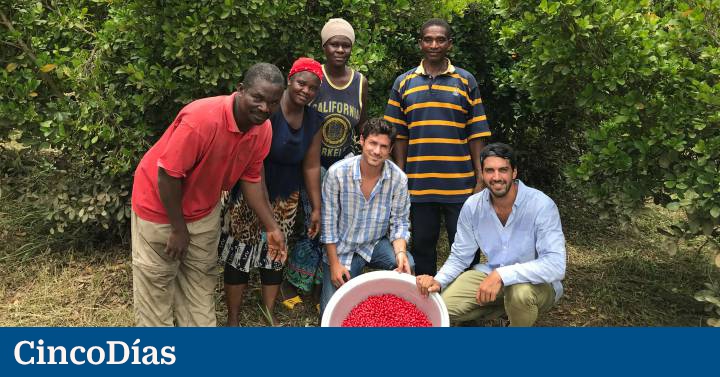According to the latest results of the ANIBES study, each Spaniard consumes an average of 71.5 grams of sugar per day, triple the amount recommended by the World Health Organization (WHO).
Faced with this fascination for sugar, the
Spanish
start up
Baïa Food brings an alternative that allows you to enjoy the sweet taste without the associated calories: miraculin, a protein extracted from the
Synsepalum dulcificum
berry
, popularly known as
miracle berry
or miraculous berry.
After eight years of research and an investment of more than one million euros in R & D & i,
this month
foodtech
received the scientific endorsement of the European Food Safety Authority (EFSA) for the human consumption of miraculin, leaving just one step from being authorized by the European Commission to commercialize, during the next five years and exclusively throughout the community block, this protein, capable of transforming any sour taste into sweet.
"It is a tool for the consumer to reduce the intake of sugar and artificial sweeteners," says Guillermo Milans del Bosch, co-founder of Baïa Food, who discovered the power of this fruit after his partner, Loan Bensadon, told him in 2013 about its property as a flavor modifier.
Loan Bensadon and Guillermo Milans del Bosch, founders of Baïa Food, in Ghana.
Then, Milans del Bosch understood not only the economic potential of miraculin, but also the health benefit it had.
He had suffered peritonitis that cost him a meter of his intestine.
From that point on, his diet changed dramatically, avoiding added sugars or sweeteners and subjecting each nutrition label to constant scrutiny.
"Many industrial products have hidden sugar," he says.
Sweet, in two steps
The
foodtech
proposal
is still somewhat more rudimentary than the typical spoonful to sweeten a coffee.
On the other hand, the sweetness with miraculin is achieved in two steps: first the dehydrated berry is consumed, for example in the form of candies, and then the food whose acid flavor is to be transformed to sweet is ingested, such as kefir or a yoghurt.
"The effect is immediate and can last between 30 minutes or an hour," says Bensadon, who explains that the maximum peak in the ability to modify the flavor is reached after a minute and a half.
Harvest of the berry from which the miraculin is extracted.
Baïa Food.
But the future dream of the
start-up
is to include miraculin directly in food products.
Until now, the authorization they are waiting for from the European Commission allows them to market it as a food supplement, which means that the presentation may vary between lyophilized powder, tablets, flakes or granules;
but it implies, in turn, that it cannot be added as an ingredient in meals.
In addition, according to EFSA, the recommended daily amount is limited to 0.7 grams.
At the moment, the format for direct sales to the public in
Baïa Food's
ecommerce has yet
to be defined, but both founders affirm that the B2B sale will be in powder form, for which they calculate a price of around 2,000 euros per kilogram of protein.
In danger of extinction
Although the use of miraculin is standardized in countries such as Australia, Japan and the United States, its application in the European Union was unknown territory.
Therefore, before embarking on the project, Milans del Bosch and Bensadon decided to test the miracle berry directly on the plantation in Ghana.
Three things caught his attention: the naturalness with which this fruit was used in the acid-sour diet typical of the African territory, the dedication with which the farmers had devoted themselves to the cultivation of the berry for generations and the risk of extinction of the botanical species.
“You had to tell the world what this fruit was capable of doing.
They had the crop and we could get the market, ”explains Bensadon.
Eight years later, not only have they achieved the first step to enter the European market, but also, collaborating directly with farmers to promote cultivation at source, the berry has gone from the category of "endangered" to "least concern", in the International Union for Conservation of Nature (IUCN) list.
Spanish landmark
Berry 'Synsepalum dulcificum'.
Baïa Food
New Food.
Baïa Food hopes to obtain authorization from the EC to commercialize miraculin in the next five months. With this, it will become the second Spanish company to introduce a New Food or 'Novel Food' on the European market, the category for foods that have not been significantly consumed in humans before 1997, when the regulation came into force. in the EU. An achievement for which the 'foodtech' highlights the financial support of the Center for Industrial Technological Development (CDTI).
Miracle recipes.
Loan Bensadon insists that the introduction of miraculin as a food supplement is the door to culinary innovations for people looking for an alternative to using sugar. In fact, in the United States, where the use of miraculin is more advanced, the berry became in 2013 the star ingredient of the creations of the renowned chef Homaro Cantu, adept of molecular gastronomy, who used miraculin in the form of tablets to make their famous sugar-free cheesecake.
Sustainable production.
According to Milans del Bosch, American or Asian companies tend to bring the genetic resource to their territories, but Baïa Food has opted to work with local partners in Ghana to generate employment and promote sustainable production based on solar energy and biogas. "It is about improving the quality of life of both the producer and the consumer," he insists.












